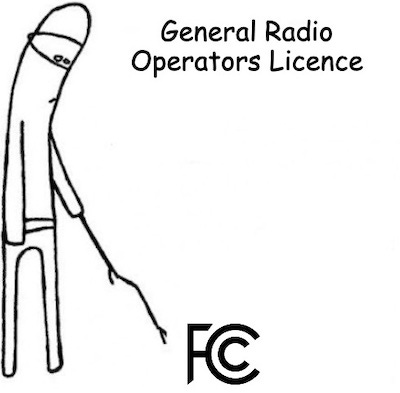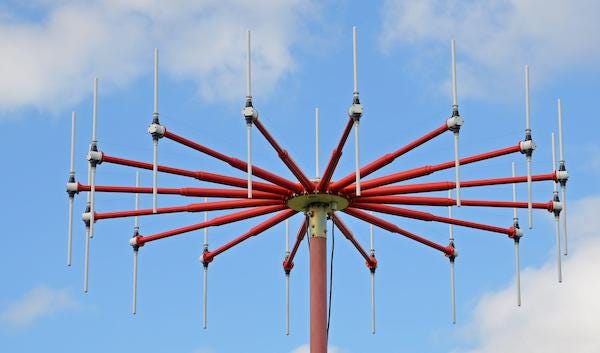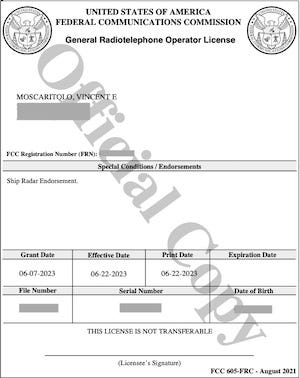Recently, my son obtained his commercial pilot license and expressed interest in obtaining a Restricted Radiotelephone Operator Permit (RR) from the FCC. This permit is necessary for pilots who fly outside the United States or operate an HF radio. As I had been exploring the FCC website while pursuing my amateur radio licenses, (see my previous article “Hamming it up”), I was glad to help him with his research.
This turned out to be an easy task, all he had to do was to register with the FCC and pay the licensing fee of $70. The fee is valid for the lifetime of the licensee.
Propitiously, while researching, I stumbled upon yet another rabbit hole I couldn’t resist exploring. It turns out that in the early 1980s, the FCC not only made changes to Amateur radio licensing but also revamped the licensing process for commercial radio operators and introduced the Marine Radio Operators Permit (MROP) and the General Radio Operators Licence (GROL).
The GROL is “required for any person who adjusts, maintains, or internally repairs FCC-licensed radiotelephone transmitters in the aviation, maritime, and international fixed public radio services.”
Hmm.. This sparked my inner overachiever. How do you get a GROL?
Similar to amateur radio, licenses for commercial radio operators are issued and maintained by the FCC, but a third-party organization handles the testing process. But unlike amateur radio, where the Volunteer Examiner Coordinators (VEC) conduct the testing, commercial radio operator testing is carried out by private groups called Commercial Operator Licensing Examination Managers (COLEMs). Currently, about a dozen COLEMs are certified by the FCC, and the exam fees hover around $75.
There are additional licenses for the Global Maritime Distress and Safety System (GMDSS); if all goes as planned, I will write about that later.
Marine Radio Operators Permit
To operate the radio on sea vessels and certain vessels sailing the Great Lakes weighing over 300 gross tons or carrying more than six passengers, individuals must obtain the Marine Radio Operators Permit, also known as MP or FCC Element 1.
To become a certified maritime radio operator, one must pass the Element 1 test. This test covers fundamental radio law and operating practices, essential knowledge for every marine operator. Just like amateur radio, the questions come from a published exam pool. A passing score requires a minimum of 18 correct answers out of 24.
The test topics include:
Equipment, Licensing, and Rules & Regulations
Practices related to Watch-keeping and Log-keeping
Radio operations and procedures
Distress, Urgency, and Safety Communications
The Global Maritime Distress and Safety System (GMDSS)
Survival Craft radio
Search and Rescue Radar Transponder (SART)
Emergency Position-Indicating Radio Beacon (EPIRB)
NAVigational TEleX (NAVTEX)
Equipment Faults, Power Sources, and Antennas
Regarding exam preparation, I didn't find the study guide from the Mid-Atlantic Maritime Academy to be very useful. It was not much different from just reading from the question pool. However, I stumbled upon a helpful YouTube playlist called "Element 1 Training" by James Rowe.
General Radio Operators Licence
If you plan to adjust, maintain, or internally repair FCC-licensed radiotelephone transmitters in aviation, maritime, or international fixed public radio services, you must possess the General Radio Operators Licence, commonly known as GROL, PG, or FCC Element-3.
To acquire a GROL certification, you must possess a Marine Radio Operators Permit. This means the GROL holder has the same operating authority as an MROP holder. In addition, the GROL holder can operate the compulsory ship radio equipment with more than 1500 (PEP) watts or voluntarily ship and aeronautical stations with more than 1000 (PEP) watts.
With these additional privileges, it is not surprising that the GROL test is much more complicated than the MROP and requires a minimum passing score of 75 out of 100 correct answers.
The exam pool is more electrical-engineering oriented and consists of questions related to.
Electrical principles and math
Circuit components
Practical circuits (analog and digital)
Radio transmitters and receiver design
Antennas, feed lines, and radio wave propagation
Aircraft radio and direction finding, including DME, VOR, ILS
Safety and Radiation exposure issues
Yes, that’s a lot of material, but at least by the time you are done studying for the GROL, you will have a good understanding of how aircraft Instrument Landing Systems (ILS) and aircraft direction-finding systems work.
Unfortunately, I could find no good study resources for the GROL online. I had to depend on the question pool to drive my research.
Radar Love
One of the benefits of possessing a General Radio Operators Licence is that it makes you eligible to take the FCC Element 8 Ship Radar Endorsement test. This addition allows the GROL license holder to install, service, and maintain a ship’s radar systems.
To pass the Element 8 endorsement test, one must correctly answer at least 38 out of 50 questions.
As anticipated, the exam is quite technical, involving questions pertaining to:
RADAR principles and theory and design
Transmitting and receiving systems
Displays and control
RADAR antenna systems
Installation, maintenance, repair, and safety.
Although I couldn't locate a suitable study guide for the exam, I was able to use the question pool to create an overview of the topics. I did, however, come across the US Navy publication NAVEDTRA 14190, as well as the Radar Navigation and Maneuvering Board Manual (Pub. 1310) from the US Maritime Safety Information Center, both of which proved to be beneficial in comprehending the concepts involved.
After digging deep into the technology, the functionality of RADAR is genuinely remarkable. As well as it’s components, such as the magnetrons, which we daily take for granted in our microwave ovens, are truly impressive. If there ever were a candidate for adapted alien technology, it would be the magnetron.
Study and testing experience
Unfortunately, when it comes to studying for MROP, GROL, and Radar endorsement, there is a lack of quality study resources available online, nowhere near what is available from the amateur radio community. Many of them are overhyped duplicates of the question pool.
Although I am aware that there are commercial and college courses available, they tend to be expensive in terms of both time and money, so I opted to teach myself the subject matter instead.
I was delighted to discover that the Ham Study app, which I use to prepare for my amateur radio license, also includes a comprehensive set of the FCC element 1, 3, and 8 exam questions. I used the same study techniques that helped me pass my Amateur-Extra exam.
I opted for the online testing provided by Mariners Learning Systems. They monitor you during the test through a web-based application that uses your computer's camera and microphone. The best I can tell, someone there does a video review, and once you pass, they will issue you a certificate. You must then fill out the usual FCC Form 605 and FCC Form Schedule E, which Mariners Learning System will send to the FCC.
Once again, don’t bother buying the books from them, unless you want a printed copy of the test pool. Please be aware that if you intend to take any test packages with multiple sections, only the highest level section will be awarded a certificate. For instance, you will only be issued the GROL certificate and not both the MROP and GROL.








